Columns
- Says Puluwan Sri Lanka will emerge as a political force for other elections
- Notes most people have forgotten that we’re still in debt and insists President’s economic
programme be allowed to go on to build a stable country - Political crossovers in full swing as main candidates intensify campaign
By Our Political Editor
They grew up together in the 1950s as friends and classmates. It was first in the Royal Primary School and later at Royal College. They played soccer and cricket together. “I never gave him a hora out (or a false dismissal),” says Prime Minister Dinesh Gunawardena laughingly. This was when standing in for an umpire, and his colleague, Ranil Wickremesinghe, was at the crease.
At the end of their studies, they had parted ways. Eventually, Gunawardena became the leader of the Mahajana Eksath Peramuna (MEP) and Wickremesinghe the leader of the United National Party (UNP). If one was mostly in governance, the other was in the opposition or vice versa. But fate, in the form of Wickremesinghe becoming president in 2022, decreed they get together. Wickremesinghe, who became president, picked his erstwhile classmate and playmate as his prime minister.
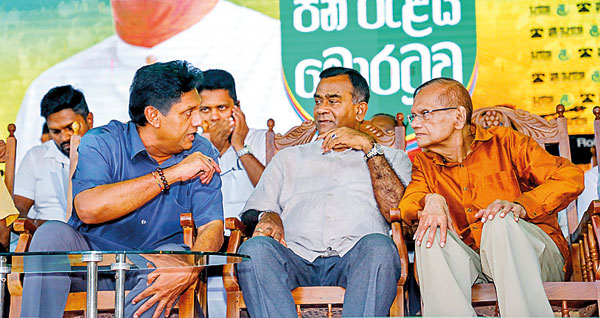
SJB leader Premadasa at his Moratuwa rally on Thursday
Both learnt music at primary school from one of the country’s most illustrious personalities, maestro Wannakuwattawaduge Don Amaradeva. Not many know that when Qaumil Salaam Dhivehi is played in neighbouring Maldives, it is Amaradeva who composed the music for that national anthem. Until then it was only a melody with no lyrics.
As Prime Minister in later years, Wickremesinghe wanted to honour Ameradeva. He was invited to the Parliament complex for a felicitation ceremony. Speaking on the occasion, Premier Gunawardena recalled Wickremesinghe’ speech. He said it was Amaradeva who taught them “Sari Ga Ma Pada Ni Sa.” (This is a set of seven notes that form the basic framework used in Indian classical music to compose melodies and improvise). Then, Gunawardena said, Premier Wickremesinghe confessed rather humorously that it was the reason why we both had to end up in politics.”
Some two weeks ago, President Wickremesinghe chose Premier Gunawardena once again. This time to oversee his presidential election campaign. “I chair most of the committees that are directing our political programme,” the premier said talking to the Sunday Times from his office at “Temple Trees.” He said President Wickremesinghe has separated his electioneering work from his Secretariat to an office in Flower Road. One of the main tasks is vesting campaign managers for specific areas. “Whilst President Wickremesinghe heads the government parliamentary group and gives them directions, I also focus more particularly on the Colombo district,” he said. “I conduct progress review meetings at least three to four times a week,” he added.
Premier Gunawardena said a future government, which President Wickremesinghe plans to form after victory at the September 21 election, will function under the banner of Puluwan Sri Lanka comprising 34 political parties. Formal recognition of the name will be sought. Their representatives meet me twice every week to assess our campaign progress, he added. He asserted that “we must keep the MPs going since an overwhelming number, despite their political contradictions, have supported us. This has included a large number from the Sri Lanka Podujana Peramuna (SLPP).” He noted that throughout his association with President Wickremesinghe, he has neither had a serious argument nor a strong difference of opinion.
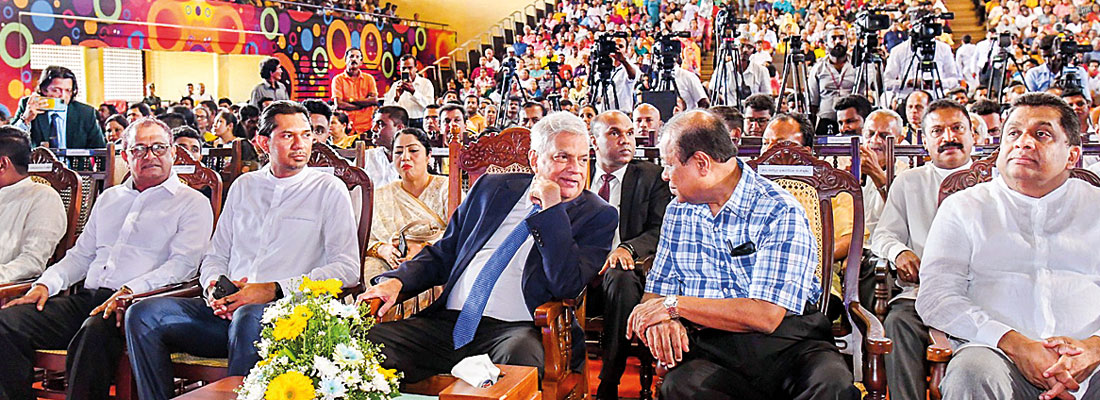
President Wickremesinghe taking part at the Nawa Janatha Peramuna meeting at the National Youth Council auditorium on Thursday
Premier Gunawardena gave a brief insight on plans by President Wickremesinghe if he gets re-elected as president. Here is a Q & A:
Q: Do you have a political roadmap if President Wickremesinghe is re-elected?
A: Yes. The President has clearly presented his vision to Parliament and to the country. The economic programme which must be followed, the framework, if we are to come out of this crisis, and achieve a stable, strong economy.
So, some say too much of IMF, therefore we don’t agree. Some say less of something, taking pieces, but overall it is a path that we have discussed as a government, as the coalition with international bodies, the IMF, the World Bank, the Asian Development Bank, donor countries and the Paris Club members. We are still in debt. People are forgetting that we are in debt. Sri Lanka cannot be continuing to be in debt in this manner.
Q: Does that mean that we are still bankrupt?
A: No, we are in debt. Bankruptcy is another stage of very serious debt, when the debtors say we don’t want to have anything to do with you. The financial world was at a standstill. No one was able to open a Letter of Credit, because the other side was not honouring it. Our earnings were from the little we exported. It was a serious situation with former President Gotabaya Rajapaksa giving up the presidency. This is an unprecedented economic crisis. We have been able to find a path which is very difficult. It was not very undemocratic.
Greece collapsed, but that was not the model we followed. Few years ago, Portugal and Spain collapsed. They were in critical debt problems. The models they followed were different. As Minister of Public Administration, ever since we took over the matter of restructuring, we did not follow Greece. No public servants were kept without salaries; their services were not terminated; pensions were paid. The Opposition claimed that the President would fail. He was able to overcome the initial stages and get the confidence of the people back to a running economy.
Q: Will Parliament be dissolved If President Wickremesinghe wins?
A: Of course. The President has a Parliament which can go on until August next year. He will first have to think of the budget for 2025. The framework has been passed in Parliament. Various aspects in keeping with the wishes of the public need to be incorporated. The budget comes in November, after the election, he will have to move towards the next budget. Otherwise, it will be a Vote on Account for the first three months of next year and then declare parliamentary elections.
Q: What follows thereafter?
A: We have not had Provincial Council elections for almost five years. We will have to have provincial elections.
Q: Can it come before the Parliamentary elections?
A: We must make amendments to certain laws before that.
Q: What about Local Council elections?
A: The Supreme Court is due to make an announcement today (Thursday). We will respect whatever decision that comes. Parliament can make amendments to laws here too. It is only then that Local Council elections can be held. Already nominations were concluded about one and half years ago. When Ranasinghe Premadasa was president, there was a similar situation where the nominations were cancelled as elections could not be held.
(Note: The Supreme Court ruled on Thursday that the President, in his capacity as Finance Minister, the Attorney General and former members of the Election Commission had violated the fundamental rights of Sri Lankans by postponing the 2023 local council elections. The court directed the Election Commission with all relevant state institutions to conduct these elections without delay.)
Q: Are you hoping to be reappointed as Prime Minister if President Wickremesinghe wins the election?
A: That is up to the President.
Q: On the question of Bribery and corruption. There is strong criticism about the visa scheme. It is known that Minister Tiran Alles, the founder of the scheme, came in for strong criticism at the Cabinet meeting.
A: Some new relaxations are coming. Also on the issue of passports, I think there has been a glut of people wanting passports. That matter was resolved, and I think in the next few days some confidence will come.
Q: Are you going to do away with the visa scheme?
A: On visas, we have already relaxed it in respect of some countries, including China. There was delay in relation to Korea, that too we have resolved. We are considering relaxing it further. This will help us get more tourists and the outsourcing of visa arrangements can be further relaxed.
Q: So you will do away with it?
A: Most of the countries have done away restrictions. But nominal requirements are necessary on arrival. Some of the other countries have gone much further. Advanced regulations have been introduced. The electronic world has advanced. Sri Lanka must advance and modernide. Tourism is the key area to boost the economy.
CROSSOVERS CONTINUE
The popular sport of politicians and parliamentarians crossing from one side to another continued this week, too. Moving into support Ranil Wickremesinghe were Ali Zahir Mowlana (SLMC – Batticaloa district) and Vadivel Suresh (formerly of the SJB from Badulla district). President Wickremesinghe swore in Mowlana as Minister of Development Projects with no cabinet rank and Suresh as State Minister of Labour. Matale district MP Karunadasa Kodituwakku crossed over to the SJB and declared he would back the candidature of Sajith Premadasa. One thing these political pole vaulters never fail to say is that they were doing this for the country. Angajan Ramanathan, Vice President of the SLPP in the Jaffna district, has also announced his support for Wickremesinghe.
A more significant political development was the resignation from Parliament of SJB parliamentarian Thalatha Athukorala after she made a scathing attack on Premadasa, her leader till then. In a lengthy speech, she declared, “Economically, our motherland had collapsed, and we had become bankrupt. We are faced with such a situation for the first time in history. We must face a decisive presidential election during a time when the country is facing economic decline. I have the same blood of the then UNP General Secretary, Gamini Athukorala, who was my brother. He worked towards bringing his party into power during a very difficult time. He was a leader who did not leave the party for personal gains.
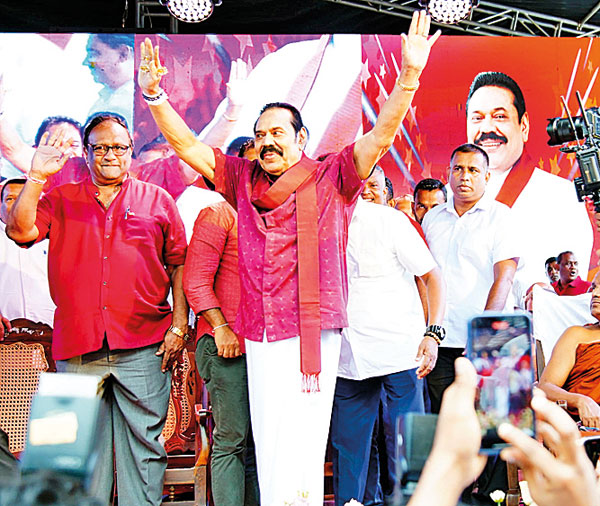
SLPP leader Mahinda Rajapaksa waving to the crowd who had come for SLPP's presidential candidate Namal Rajapaksa's inaugural meeting in Anuradhapura
“On one side the huge mother party, the UNP, has divided into two, the leader of our mother party and the former deputy leader have become political enemies. Both are contesting to become the president of the country. In such a decisive moment others are trying to get together, but our camp is divided, and two candidates are contesting. That is against my conscience and, therefore, I cannot agree to it in any way. The decision taken by both leaders to divide into sides and contest the election is appalling politically. It is a selfish decision taken without considering the future of the country.
“My belief is that, if we are to win this election, we need to get together and contest the presidential election without dividing and contesting separately. Ranil Wickremesinghe had repeatedly invited us to join him. I cannot think why Sajith Premadasa had rejected it. I feel like Premadasa wants to become the President hurriedly. However our past leaders have practically proven how patience is important in politics; we should learn from it at least now.
“When the JVP, which had three percent of the vote, is becoming a powerful camp as the National People’s Power (NPP), the most powerful and the biggest party, the UNP, has divided itself into two. We are always thinking about why we are divided. Today our leader and former deputy leader have become separate candidates; it is a foolish move to have two candidates from the same camp. The reason for the division of our camp is not a policy matter. The reason it happened was the party lacked centralized democracy leading to a problem with the party leadership. However, he (Ranil Wickremesinghe) had been appointed as the President of the country. The Rajapaksas are contesting separately, when our victory is served on a platter why aren’t we taking the chance; why can’t we understand the simple truth?”
The campaign, particularly by three formidable candidates—Ranil Wickremesinghe, Sajith Premadasa and Anura Kumara Dissanayake—has begun to heat up. All three, together with Namal Rajapaksa, a late entry, are drawing crowds at rallies. Unlike in previous elections, the crowd turnout may not be the sole indicator of a winner, a number two or three. The Sri Lankan electorate is now savvier politically and they want to learn from most candidates. They will decide on September 21.
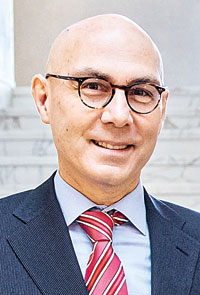 United Nations Human Rights High Commissioner Volker Turk UNHRC issues tough report on Sri Lanka’s human rights violations United Nations Human Rights High Commissioner Volker Turk has made a series of strong strictures against Sri Lanka in a report due before the 57th sessions that begin on September 9. The 17-page “advance unedited version,” appearing on the UNHRC website, has listed several areas and provided a catalogue of conclusions and recommendations. It acknowledges that the government has rejected resolutions 46/1 and 51/1 adopted by the UNHRC. This is particularly in respect of two separate operative paragraphs. “We have not misled anyone in the international community. Criticism is bound to remain, but we will always enlighten others about our position,” Prime Minister, Dinesh Gunawardena said commenting on the report. He said, “We have addressed many issues. Even now we are taking positive steps.” Among others, he said, the government would soon establish a Truth and Reconciliation Commission. Here are some edited highlights of the issues raised by Human Rights High Commissioner Turk:
The conclusions and recommendations made by Human Rights High Commissioner Turk include the following: “As Sri Lanka approaches Presidential and Parliamentary elections, it has an opportunity to recommit to the transformational changes demanded by the broad cross-section of Sri Lankans who protested in 2022. The Government has a responsibility—prior, during and after the election period—to fully protect and respect the rights to freedom of expression, association and peaceful assembly, including by refraining from the use of unnecessary or excessive force against protestors, to take measures to prevent and tackle divisive and discriminatory rhetoric and practices, based on religious, gender or other grounds, and prevent election-related and other human rights violations and abuses. “The High Commissioner is mindful of the deep impacts the economic crisis and debt burden are having on all Sri Lankans, particularly the poorest and those in other situations of vulnerability. This economic stress is exacerbated for Sri Lanka and many other developing countries by the prevailing global economic situation and international financial architecture. He urges that decisions on economic policy and fiscal consolidation be guided by Sri Lanka’s international human rights obligations, including by ensuring adequate social protection. Sri Lanka’s external creditors should provide the Government with the fiscal space needed to realise economic, social and cultural rights and to ensure austerity measures do not undermine Sri Lanka’s ability to fulfil its human rights obligations. “Emerging trends observed during the reporting period, including a continuing lack of respect for fundamental freedoms as evidenced by new regressive laws, erosion of democratic checks and balances, instances of threats, intimidation and violence against victims, civil society actors and journalists and resurfacing of serious human rights violations of the past, are of deep concern. “Failure of the Sri Lankan State to specifically recognise victims’ suffering, to acknowledge the military and other security forces’ role in the commission of gross human rights violations, and to address violations committed in the past and present, has been a key obstacle to the rule of law, democracy, and good governance. Many of the structures and some of the members of the State apparatus credibly implicated in the grave crimes and human rights violations remain in place, preventing meaningful progress in terms of accountability and perpetuating human rights violations. As noted in the report to the 51st Human Rights Council session, entrenched impunity has also been manifested in the corruption and abuse of power that contributed to the economic crisis and drove the popular protests in 2022. “Following the elections, the newly elected Government should—as a matter of urgency—pursue an inclusive national vision for Sri Lanka that addresses the root causes of the conflict and undertakes fundamental constitutional and institutional reforms needed to strengthen democracy and devolution of political authority and advance accountability and reconciliation. “Fundamental changes are needed for advancing accountability, reconciliation, and preventing future human rights violations and the abuse of power. This includes implementing significant security sector reforms, which should involve vetting to remove those implicated in serious violations and establishing an operational and judicial framework ensuring strict compliance with human rights standards. The Government should undertake the constitutional, legal and institutional reforms necessary to comply with the country’s international human rights obligations, prevent the recurrence of grave violations and strengthen democratic and devolved systems of governance. OHCHR continues to stand ready to assist Sri Lanka on this path. “The Human Rights Council and individual UN Member States should continue to fill the accountability gap in Sri Lanka by supporting and using the full potential of OHCHR’s strengthened capacity to undertake accountability-related work under Human Rights Council resolutions 46/1 and 51/1 and contributing to creating necessary conditions and political will for undertaking meaningful accountability and reconciliation efforts in the country. Among their recommendations: = Repeal or amend existing laws or proposed laws that unduly restrict the rights to freedom of opinion and expression, association, and peaceful assembly, including the Online Safety Act, ICCPR Act, draft NGO Bill, and proposed amendment to the Telecommunications Act; = Publicly issue unequivocal instructions to all branches of the military, intelligence and police forces that arbitrary arrests, extrajudicial killings, torture, sexual violence and other human rights violations are prohibited and will be systematically investigated and punished; = Establish as a matter of urgency an independent prosecutorial authority, separate from the AG’s function, to assess relevant information and make independent prosecutorial decisions, including in relation to the cases of human rights violations and violations of international humanitarian law committed in previous decades; = Avoid the involvement of the military in law enforcement, commercial and civil affairs and significantly reduce military presence in the Northern and Eastern Provinces. = Assess the negative impact of corruption on the enjoyment of human rights and ensure the adoption of anti-corruption measures aligns with human rights obligations. = Stop the ‘Yukthiya’ operations and release all individual detained under this operation; provide community-based treatment, rehabilitation and harm reduction support to people with drug dependency; and develop and implement a human rights and public health-centred drug policy in line with the International Guidelines on Human Rights and Drug Policy.
| |
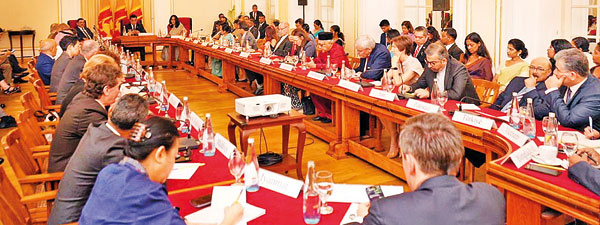 Foreign Minister Ali Sabry briefing the Colombo-based diplomats on Sri Lanka's response to UNHRC chief's strictures Govt. rejects UNHRC charges as unbalanced, incorrect and in contravention of natural justice Sri Lanka has dismissed accusations by UN Human Rights High Commissioner Volker Turk in his latest report but has assured “close engagement with the international community and the United Nations.” The response of the government, to a 17-page report by Human Rights High Commissioner Turk for the September 9 Council sessions, has answered the issues raised point by point. In addition, the government has also apprised member countries as well as other nations of its position on the issues raised in a diplomatic note. The government’s observations, “in a spirit of co-operation and engagement,” seek to provide a “balanced perspective of developments in Sri Lanka,” says the response. Foreign Secretary Aruni Wijewardene also briefed Colombo based diplomats on the issue on Friday. Here are edited highlights of the Sri Lanka response: • The period covered by the present report is one of the most remarkable in Sri Lanka’s recent history. It is widely acknowledged that during this period, in a combination of prudent economic decision-making as well as measures of financial oversight and governance, Sri Lanka was not only successful in democratically overcoming unprecedented challenges on the social and political front, but also in stabilizing its economy following its worst economic crisis in recent history. The period under review also witnessed the strength of Sri Lanka’s democratic traditions, institutions and practices. Both the Government and the people exercised restraint and ensured that the political transition which took place following the social unrest was within the framework of the Constitution, safeguarding democratic and parliamentary procedures. • The High Commissioner’s interpretation of the impact of the economic crisis on the promotion and protection of economic and social rights overlooks the fact that in the transition from the debt-driven economic crisis towards stabilization and higher inclusive growth, certain budgetary restrictions are inevitable including public spending. Such measures are likely to cause short-term adverse impact on all, including on vulnerable segments of the population. This is not done with the intention of denying individual rights. • ONLINE SAFETY ACT (OSA): Alarming growth in crimes committed using digital technology and online platforms has necessitated the strengthening of measures to safeguard the rights of individuals and society against such platforms. The Online Safety Act passed by the Parliament of Sri Lanka on 24th January 2024 is aimed at addressing this issue of growing public importance and thereby to protect the vulnerable sections of society in line with international standards. • ANTI-TERRORISM BILL: The new Anti-Terrorism legislation, inter alia, is expected to repeal the Prevention of Terrorism Act. • CIVIL SOCIETY AND THE NGO BILL:- In keeping with international obligations and sound financial regulation and practice, it is essential to ensure regulations and management of these entities in terms of governance. This includes addressing concerns such as terrorism financing, money laundering etc. • URUMAYA PROGRAMME: The Government initiated the Urumaya programme on 5 February 2024 focusing on land rights and housing. Sri Lanka is the only South Asian nation offering free land rights to its citizens. • COMMISSION FOR TRUTH AND RECONCILIATION: The proposed Bill to establish a Commission for Truth and Reconciliation is aimed to ensure the right of all Sri Lankans to know the truth concerning complaints or allegations or reports relating to damage or harm caused to persons or property, loss of life or alleged violation of fundamental rights anywhere in Sri Lanka during the period 1983–2009 and its aftermath. The government has rejected all conclusions and recommendations including references to targeted sanctions/future accountability processes as “they are based on incorrect and unsubstantiated sources/material contravening the principles of natural justice and the principles of universality, impartiality, objectivity and non-selectivity, as stipulated in the GA (General Assembly) resolution 60/251 that created the HRC.”
|
Buying or selling electronics has never been easier with the help of Hitad.lk! We, at Hitad.lk, hear your needs and endeavour to provide you with the perfect listings of electronics; because we have listings for nearly anything! Search for your favourite electronic items for sale on Hitad.lk today!


PM explains President’s plans for future Sri Lanka
View(s):